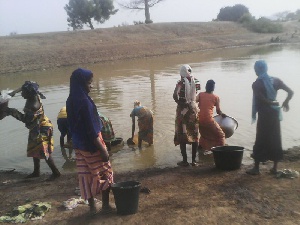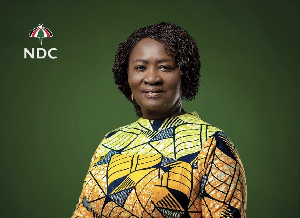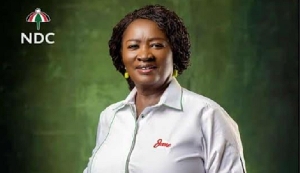“Famine and thirst sigh like a scythe across the field of statistics and the desert is a moving mouth”—Derek Walcott (The Fortunate Traveler)
During the electioneering campaign, I hardly heard any political party commenting on the issue of the pollution of our river bodies through the activities of ‘galamsey’ operators, and the use of agro chemicals in farming near rivers and streams. For the past ten years I have had cause to write extensively about the challenges Ghana and the world, for that matter, face as far as the issue of the management of water is concerned. It looks as if I am a lone voice crying in the desert. Meanwhile, in the face of the destruction of our bodies, the desert continues to drift down south from Burkina Faso and the landlocked countries.
If the incoming Minister of Environment wants to make history for himself and the current generation, he should take the bull by the horns, damn the backlash and political gains and go all out to work to save our river bodies. The sages say history is made from bold ventures. Anytime I pass by river Birim in the Eastern Region and Pra in the Central Region and other rivers severely polluted by ‘galamsey’ operators, I bend down my head in shame. It seems we are collectively committing crime against humanity through our actions and inactions. As a child, I saw the Odaw river in Accra with fishes swimming happily while the river meanders her way to the sea. Today, this hitherto beautiful river is a refuse dump. Generations yet unborn will not treat us lightly if we fail to act NOW.
Before the Minister of Environment takes office I will like to appeal to him to read the following sterling record on the water situation of the world so that he can appreciate the problems ahead. The planet is 71% water and less than 3% of it is fresh. Most of that is either in the form of ice and snow in Greenland and Antarctica or in deep underground water aquifers. Less than 1% of all the earth’s water is considered available for human needs: even then, much of it is far from large populations. At the dawn of the 21st century, more than one billion people do not have access to safe drinking water. Worst of all, 3.4 million people die each year from water related diseases. Scientist say the adult human body is about 75% water, with up to 85% human brain cells liquid; even teeth are 10% moisture! Very startling, eh? That is the stark reality for you!. So you see the global governmental neglect behind those numbers is the most critical failure of the 20th century and certainly the major challenge of the 21st century.
In parched Botswana, dominated by the Kalahari Desert, water is so precious that the national currency is called “Pula’, which means rain in the Setswana language. There the nickname of water is “Blue Gold.” In many sub-Saharan countries, according to the World Water Council, the average per capita use rates are 10 to 20 liter a day, which it calls “undesirably low”. Beset by agricultural failure, fragile ecosystems, erratic weather, war and other factors including climate change, records show 18 sub-Saharan countries face the severest problems in feeding their people. Call these a contending doom and you will not be far from right. Generally, it seems we are facing a world water gap. Scientists, water professionals, environmental campaigners and others have warned for decades that a water crisis was building but these alarm bells rang on many deaf governmental ears. Like so much of the earth’s bounty, water is unevenly distributed. While people in some parts of the world pile up sandbags to control seasonal floods or struggle to dry out after severe storm, others either shrivel and die like their crops and their livestock before them. And yet others move on as environmental refugees, all because of the unavailability of this thing called water.
Back home in Ghana, we must rethink water management. The truth is that we no longer live in an era, or a world in which rivers can be endlessly dammed, aquifers relentlessly pumped, ecosystems degraded and impoverished. We have to focus on how we use water.
Unlike what is prevailing in some countries where access to adequate and unpolluted water is increasingly being viewed as a basic human right, Ghana seems indifferent to the issue. We as people have closed our eyes to this serious problem because, for now, we can get water to drink. We have not sat down to look around us and compare ourselves to countries like Burkina Faso, Niger, Mali and other Saharan countries. These countries did not wake up one day to find that there was not enough water for them and their flocks. They were also having forests and wetlands until nature decided to punish them for one reason or the other.
Water, not oil, is the most precious fluid in our lives, the substance from which all lives on the earth have sprung and continue to depend on. If we run short of oil and other fossil fuels we can use alternative energy. If we have no clean, drinkable water, we are doomed. In fact “Water is life.” It is therefore quite appropriate for us to rethink how our water bodies are being destroyed and that is why we must heed the wake-up call by scientists to take the issue of water management seriously. The government, NGOs and local communities must address this problem as a top priority. There are many tools for doing so and the economic costs are not high compared to the costs of failing to meet these needs. Hunger and thirst are linked to political instability and low rates of economic growth.
Look at what is happening to folks in the Northern Region where guinea worms have refused to go after many years of fighting the disease? Can you imagine the man-hours lost due to the inability of those attacked by the disease to work all these years? If you are living in a big city and you have access to potable water, do not think your fellow Ghanaians living in the villages have similar advantage. In our villages, people drink from streams which are unacceptable in this 21st century. These poor folks have no alternatives but to drink this unwholesome water together with their animals. Oh, water, water, everywhere but not a single clean drop to drink!!













